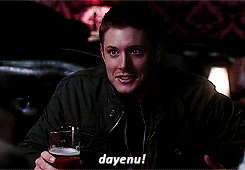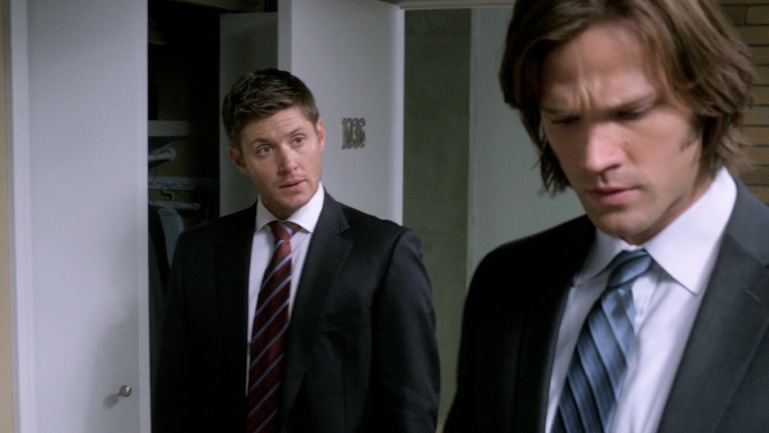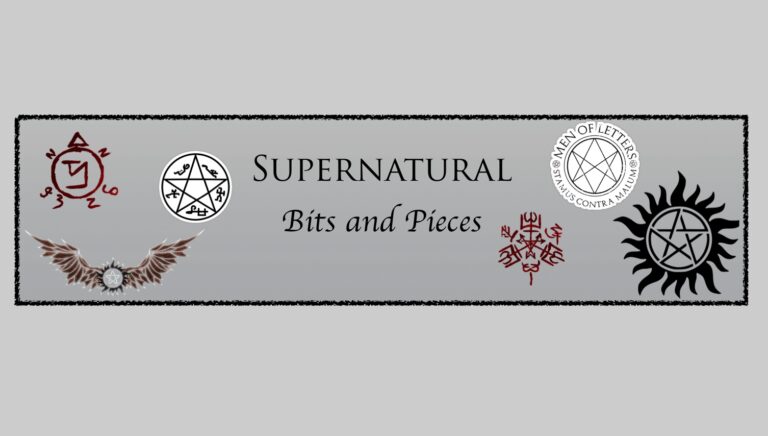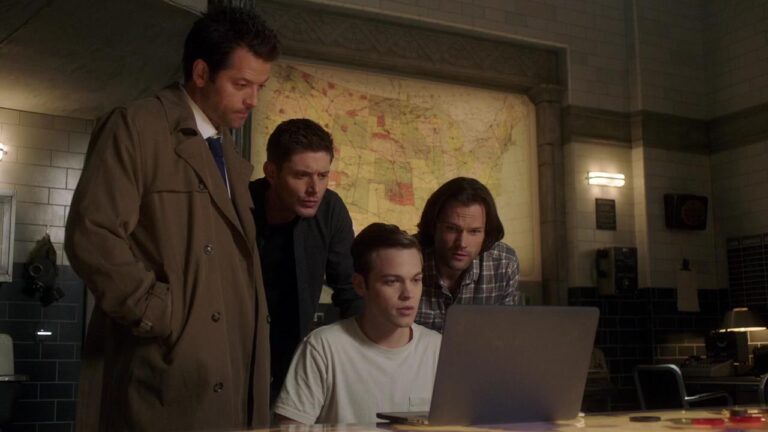Supernatural and Judaism: A Jewish Person’s Perspective
Faith has always played an important role in my life. Being Jewish has been and always will be a part of me that I wouldn’t trade for anything. The one thing that I wish I could see more of in film is the representation of Jewish people and who they really are. In recent history, we’ve gotten to see more of that with shows like Unorthodox on Netflix and plenty of others, but on mainstream cable television, we haven’t really gotten to see a lot of Jews, unless they’re a caricature, or it’s mentioned but never really played out. Additionally, we don’t often see Judaism as a whole spoken about or represented on film. We see a mention or a nod, but not often do we see Jewish characters as fully realized.
I will give Supernatural credit for trying, but more can always be done.
We’ve seen characters like Aaron Bass and his Golem, along with Rufus Turner, who both identified as Jewish. References have been made here and there to their faith. With Rufus, it wasn’t an essential part of who he was. With Aaron, it’s a little more complex than that, because the episodes he’s featured in are so focused on Jewish history and tradition. However, I will say that I think Aaron is one of the best and most fully realized Jewish characters I’ve seen on screen. I felt that the writers understood some of the complications of being Jewish in a world that doesn’t understand or doesn’t want to understand the differences between Jews and non-Jews. Aaron’s line, “Everyone loves bacon,” is a glimpse into how Jews have had to assimilate into regular culture. Now, depending on how you observe, it’s not an issue, but that line betrays an understanding of how hard it can be for Jews to feel seen and heard.
It does my heart good, though, to know that one of Supernatural‘s most well-loved and remembered female characters, Jo, was played by Alona Tal, who is Jewish and Israeli. I am proud that she got to play one of the most badass women we’ve seen on the show. Also, that Aaron Bass was played by Adam Rose, who himself is Jewish, makes me thrilled and excited.
 Taking character out of the equation for a moment, we’ve also seen a ton of other references to Judaism in the show. All of them are quite small. For example, the killing of Osiris with a ram’s horn. I can’t remember if it was referenced directly in the episode, but Sam used a shofar, which is a ram’s horn that is blown to bring in the Jewish New Year, to kill Osiris. I believe it is mentioned that he took the shofar from a synagogue, but I might be misremembering that. Another example is in “Free To Be You And Me”, when Dean took Cas to the brothel, he said, “He likes you, you like him. Dayeinu.” Now, technically, that is not the proper use of the word. In Hebrew, the word dayeinu means “it would have been enough for us.” It is the name of a prayer we say during the Passover Seder, telling of all of the things that G-d did for us, and we are saying, it would have been enough. In context, Dean isn’t using the word for its meaning, but more for its exclamatory nature.
Taking character out of the equation for a moment, we’ve also seen a ton of other references to Judaism in the show. All of them are quite small. For example, the killing of Osiris with a ram’s horn. I can’t remember if it was referenced directly in the episode, but Sam used a shofar, which is a ram’s horn that is blown to bring in the Jewish New Year, to kill Osiris. I believe it is mentioned that he took the shofar from a synagogue, but I might be misremembering that. Another example is in “Free To Be You And Me”, when Dean took Cas to the brothel, he said, “He likes you, you like him. Dayeinu.” Now, technically, that is not the proper use of the word. In Hebrew, the word dayeinu means “it would have been enough for us.” It is the name of a prayer we say during the Passover Seder, telling of all of the things that G-d did for us, and we are saying, it would have been enough. In context, Dean isn’t using the word for its meaning, but more for its exclamatory nature.
A lot of people are probably saying at this moment, “You’re forgetting the Apocalypse!” But, technically, you’d be wrong. Many people refer to the Apocalypse as referred to in Revelation as the “Judeo-Christian” Apocalypse. The thing I don’t understand about that, though, is the fact that Jews don’t believe in the New Testament, where Revelation comes from. How can something be Jewish, when it comes from something that Jews don’t even believe in? I understand that a lot of times when referring to “Judeo-Christian” people are not necessarily referring to religion, but the term implies that there is something Jewish in there. Or at least to me it does. (According to Wikipedia: “Judeo-Christian is a term that is used to group Christianity and Judaism together, either in reference to Christianity’s derivation from Judaism, both religions’ common use of the Bible or due to perceived parallels or commonalities and shared values between the two religions.” The only problem I see with this definition is the fact that, yes, both Jews and Christian’s believe in the Old Testament, but using the term Bible is too general. When I think of the Bible, I think of just the Old Testament. But ask someone raised in a Christian tradition, and they might include the New Testament there as well.) Technically, Jews don’t even really believe in an apocalypse – not in the traditional sense. Jews believe that the world will end with the coming of the Mashiach, or Messiah, and they will bring peace to all of the people Israel. It is believed that at the time of the coming of the Mashiach, all of the dead will roll to Jerusalem and be brought together under them.
Now, another thing I’d like to address while I’m here is the issue of anti-Semitism. Supernatural has done an excellent job of showing our Jewish characters as who they are, without really showing the anti-Semitism that comes along with it – Nazi’s aside. That’s it’s own thing. I can’t explain to you why people are anti-Semitic. Jews come in all shapes, colors, and sizes, so it’s not racism, sexism, or something else. People are often confused about Judaism, because most think of it as a religion, and it is. But it’s also a culture, and sort of a race. Someone who is WAY smarter than me put it this way (this was in response to a question about why people were so outraged over the Netflix film The Red Sea Diving Resort. Everyone should go and watch it):
“I understand it can be difficult for some who come from a Western-Christian centric background to understand, but unlike Christianity or Islam which are universalizing religions, Judaism is an ethnic religion. Jews are not merely those who practice Judaism; rather, Jews are a People/Nation whose historical/national/religious practices have been called “Judaism.” (To be perfectly clear on this–being a Jew has nothing to do with being of a member of a particular faith. Being a Jew is belonging to a particular ethnic group. This is why an avowed atheist can still be Jewish despite having no belief in God.)
From a historical standpoint, it’s only very recently that Ashkenazi Jews (those Jews from Europe) have been considered white. European history is replete with examples of Jews not being considered white–pogroms, blood libels, the Inquisition, the Crusades, forced conversions and exiles, etc. In RSDR, Ari and his mother were Holocaust survivors and had seen Europe (i.e., white people) engage in the genocide of their people specifically because they were not white. And with alt-right activists marching the streets of Charlottesville chanting “Jews will not replace us,” synagogues being shot up, and antisemitism on the rise globally, even in modern times the question of whether or not “white” Jews are white remains unanswered. Jews are functionally Schrödinger’s Minority.
From a genetic standpoint, Jews are not white. Even Ashkenazi Jews are a unique ethnic group, genetically distinct from other European populations. Virtually all credible studies conducted on Ashkenazi Jews have found their paternal lineage to be overwhelmingly Levantine-Middle Eastern, with the maternal line being a mix of Southern European (e.g.: Roman, Southern Italian, etc.) and Levantine-Middle Eastern, though the rates of how much of each are contested. Genetic testing has shown that Ashkenazi Jews cluster more closely with other Jewish ethnic groups, Levantine ethnic groups (e.g.: Lebanese), and Southern European ethnic groups than they do their host populations. That is to say, a Jew from Poland, whose family has been in Poland for centuries, is still genetically more similar to a Moroccan Jew, a Sicilian, or a Lebanese Christian than they are an ethnically Polish person.”
I hope that my perspective on Judaism in Supernatural as a whole is helpful to you all.
Editor’s Note: Recently, we’ve all been reminded how important representation in the shows we love is to all people. When Kate offered to share her specific perspective of Supernatural with the WFBFamily, we felt this was a wonderful opportunity to open our eyes to another person’s experience. Hopefully, these insights enrich and enlighten your viewing of the show. We invite you to share your perspectives on Judaism in Supernatural, too. Please also feel free to ask questions on Jewish references throughout Supernatural. As always, keep this a safe and respectful forum for all. – Nightsky
Catch up on Kate character analysis reviews on Supernatural’s season 14 and 15 episodes!






Leave a Reply